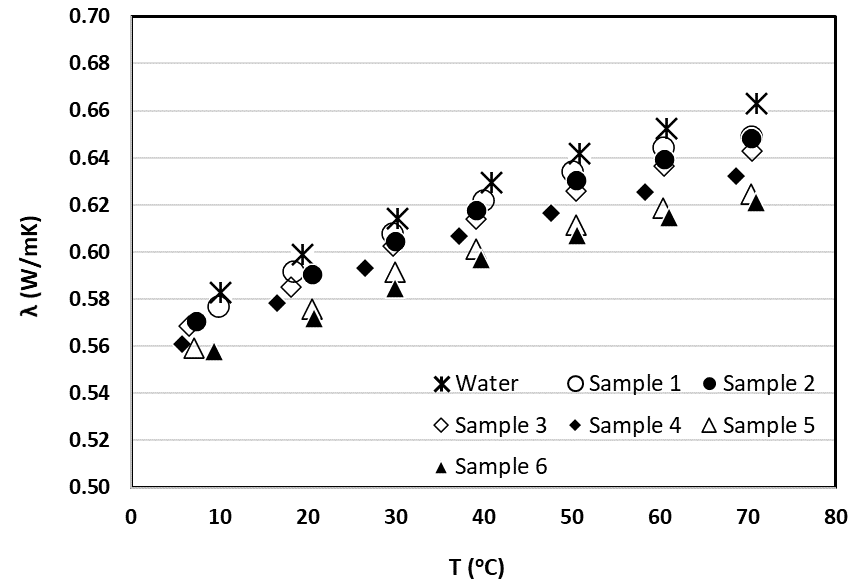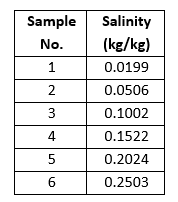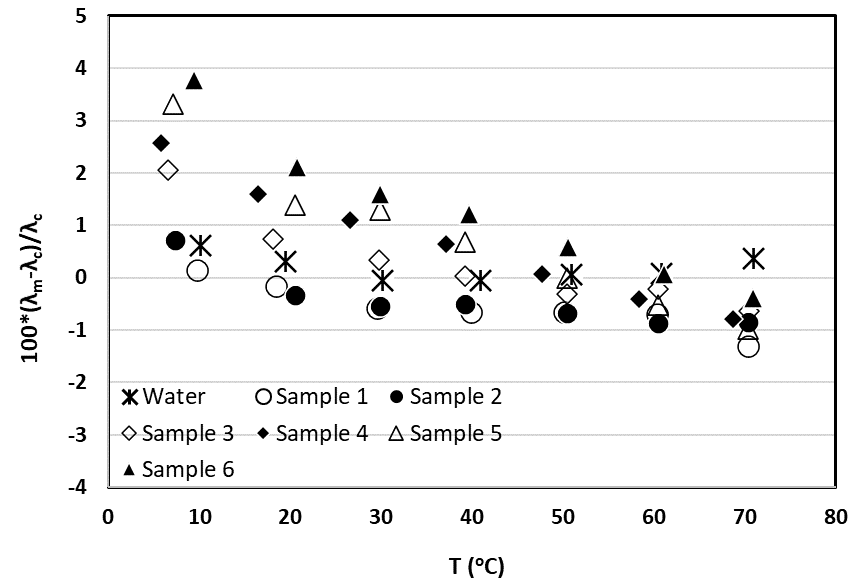The thermal conductivity (W/m·K) of pure water (H2 O) and saline solutions (water + Na Cl) were measured using THW-L2 (Transient Hot Wire Liquid Thermal Conductivity Meter) at temperatures ranging from 5 °C to 80 °C.
THW-L2 is a portable thermal conductivity meter for liquids and pastes that can measure thermal conductivity from 0.01 (W/m·K) to 2 (W/m·K) with temperatures ranging from -50 °C to 100 °C. The experiment was conducted in accordance with the ASTM D7896 – 19 standard of testing method.
The thermal conductivity of seawater is affected by temperature and salinity. It is expected that the thermal conductivity increases with higher temperatures and decreases with higher salinity levels.
In this experiment, pure water and 6 saline water mixture samples were measured for their thermal conductivity values using THW-L2. The mixtures differ in their salinity levels. The results of the experiment indicated that as temperature increased the thermal conductivity of the samples increased as expected. Results also indicated that samples with lower salinity have greater thermal conductivity, which was also expected. Pure water has the highest thermal conductivity compared to saline water mixtures.

Image 1. Graph of temperature vs thermal conductivity of 6 saline water mixture samples and water.

Table 1. Saline samples and their corresponding salinity in kg/kg.

Image 2. shows a graph of Coefficient of Variation plotted against Temperature.
For this experiment, the coefficient of variation value indicates the amount of dispersion between the measured thermal conductivity values with THW-L2, and the calculated thermal conductivity values with IAPWS Formulation. The IAPWS equation is accurate for samples of salinity up to 0.17 kg·kg-1, pressure less than 140 MPa, and temperatures ranging from 0 ºC to 250 ºC. These conditions were held true during this experiment; therefore, the calculated thermal conductivity values are accurate. The lower the Coefficient of variation is; smaller the amount of dispersion is from the calculated model. Image 2. shows that most sample points are within coefficient of variation value of -1 to 1, meaning the measured thermal conductivity values with THW-L2 are precise.
THW-L2 (Transient Hot Wire Liquid Thermal Conductivity Meter) is a highly accurate tool in measuring the thermal conductivity of salty water mixtures. The accuracy of THW-L2 is apparent from minimal disparity between measured values and calculated values. It only takes up to 2 seconds to perform one measurement and provides accuracy typically better than 5 % and reproducibility typically better than 2 %.
Huber, M.L., Perkins, R.A., Friend, D.G., and Sengers, J.V., Assael, M.J., Metaxa, I.N., Miyagawa, K., Hellmann, R., and Vogel, E. “New International Formulation for the Thermal Conductivity of H2O,”
J. Phys. Chem. Ref. Data, 41(3), 033102, 2012. doi: 10.1063/1.4738955
International Association for the Properties of Water and Steam, “Guideline on the Thermal Conductivity of Seawater”, July 2015, Stockholm, Sweden. http://www.iapws.org/relguide/Seawater-ThCond.pdf
The THW-L2 Transient Hot Wire Liquid Thermal Conductivity Meter is an advanced measurement system for direct determination of the thermal conductivity of liquids and pastes in accordance with ASTM D7896-14. Portable, economical, accurate, and easy to use. Get your results without the effects of convection.